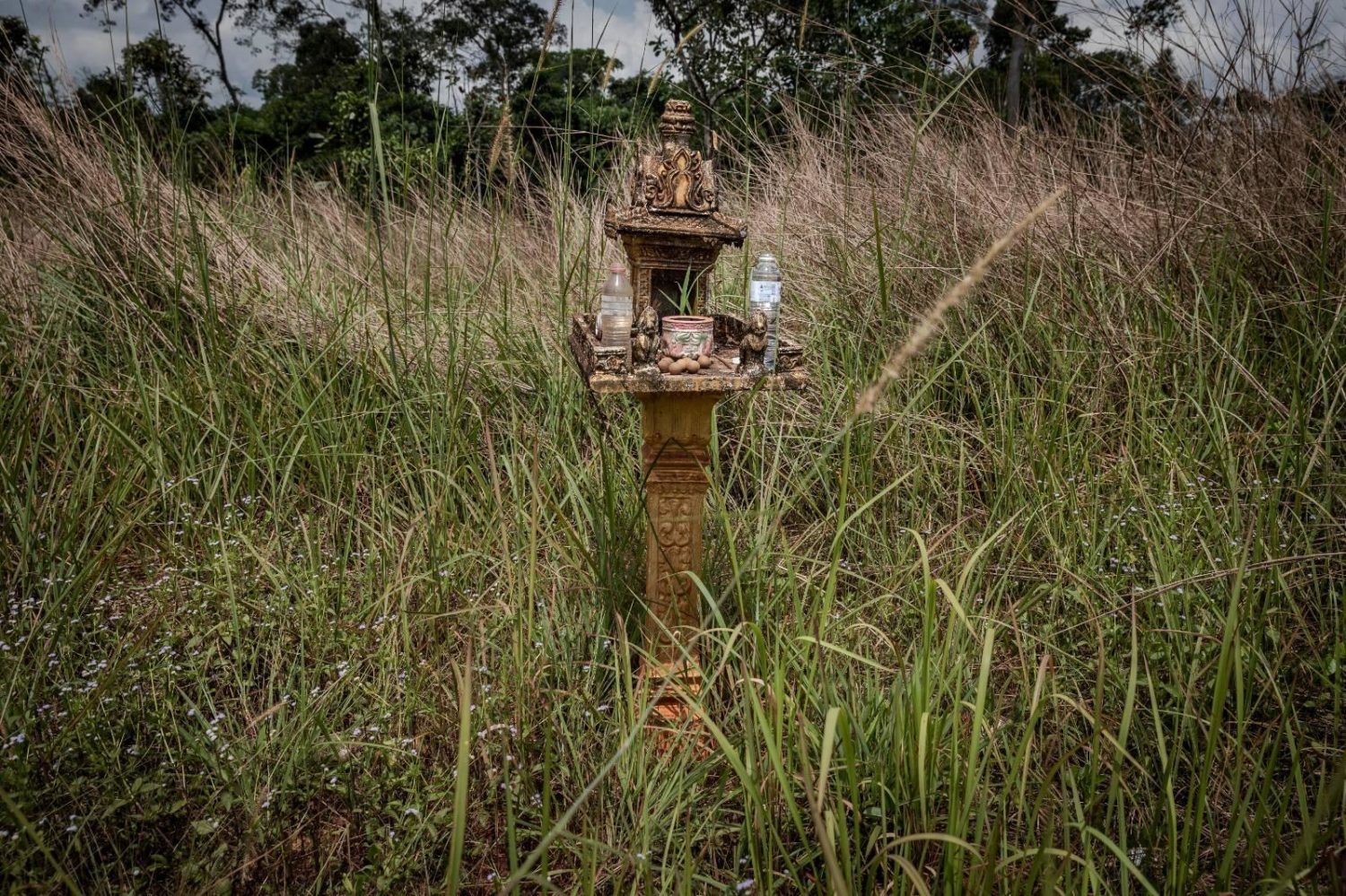MONDOL SEIMA DISTRICT, Koh Kong — On the east side of a red dirt road in northern Koh Kong is a gold-painted spirit house. One of the two water bottles opened in offering upon it appears unweathered, and below the tall green grasses that shield the house are some trampled patches, indicating a visit not so long ago. But for the most part, the cars and motorbikes that occasionally pass don’t stop or slow down.
The traffic either continues north into Pursat province, through patches of thinned forest and the occasional clearance running a kilometer wide in size, or south toward the paved road connecting two hydropower dams. On a Saturday in April, reporters sitting at that junction between dams and the forest overheard passing groups of people speaking about the earnings they can get from taking agarwood from the forest.
Chut Wutty, the activist honored by this ornate but faded spirit house, would not recognize the area. It was forest when he was shot amid his crusade against forest crimes and corruption 10 years ago today. His son, now living on the other side of the world, thinks that the unresolved murder of his father and the continuous assaults against the forest are intertwined.
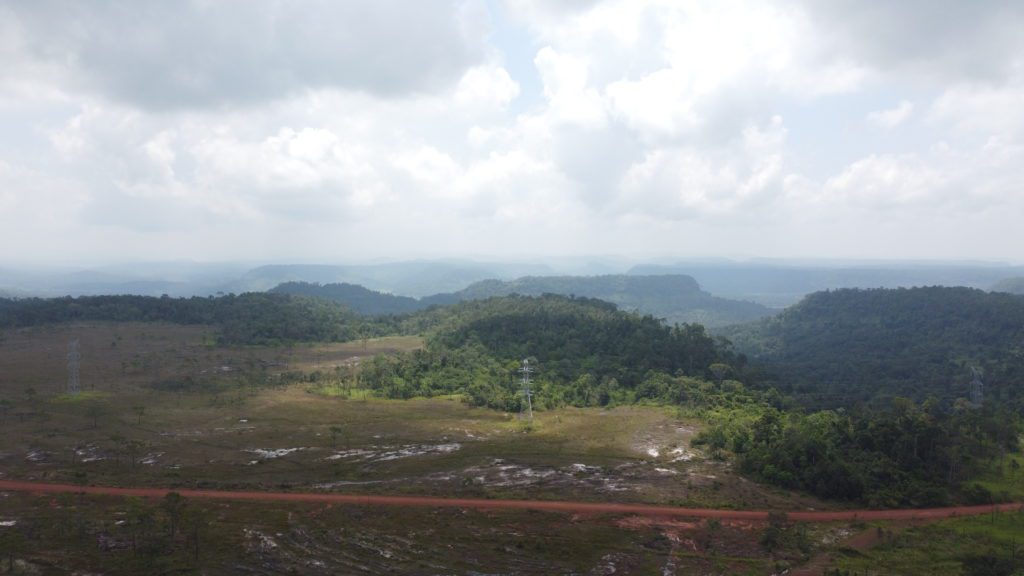
Before he was fatally shot in 2012, Wutty had emerged as one of the leading voices for forest conservation, championing conservation in the Prey Lang forest that would later become a wildlife sanctuary and — according to the account of a former journalist who traveled with him before his death — architecting the boundaries of the Cardamom Protected Forest.
Wutty worked with international environmental NGOs early in his career, but after encountering enough frustrations with the development community, created the Natural Resource Protection Group, which still exists and is run by another acclaimed activist Ouch Leng.
When he went on his own, Wutty, a former soldier, began calling out corruption. According to the 2012 account of Olesia Plokhii, a former Cambodia Daily journalist who interviewed Wutty as he campaigned to protect the forest, he confronted soldiers who were logging inside protected areas and shared evidence of crime with journalists, supplying reporters with collected testimonies from witnesses to corruption and a “bribe book” recorded by timber workers.
On the last day of his life, Wutty brought two journalists from the Cambodia Daily, back when it was an English-language newspaper, into Koh Kong’s slice of the Cardamom mountains, a point near the Pursat border called Veal Bei.
They stopped to investigate a campsite near the forest where people were collecting a yellow-vined plant, traditionally known to treat stomach sickness as well as a source of berberine, which can produce a similar effect to the drug MDMA.
This campsite was within a Cambodian-owned concession called Timbergreen, whose majority shareholder Khieu Sar Sileap directs other companies together with Prime Minister Hun Sen’s daughters Hun Maly and Hun Mana, as well as Kim Heang, tycoon and wife of CPP senator Ly Yong Phat.
By Plokhii’s detailed account, Wutty ended up in an argument with armed military police, and the argument escalated as Wutty’s car stalled. The journalists ran into the forest after hearing gunshots, and came back to find Wutty, 46, and a military police officer In Rattana, 32, both shot dead.
Haunting Suspicions
Five hours after he found out about his father’s death, Cheuy Oudormreaksmey, now 29, recalls that the government hastily established a special committee to investigate. Three reports came from this committee within the span of a day, he told VOD over a call.
The first alleged that Rattana shot his father, and then a ricocheted bullet struck and killed the military officer. A second report from hours later found that Rattana shot Wutty, and then the officer died when Ran Boroth, a hired soldier for Timbergreen, tried to wrench a firearm from Rattana. The third said that Rattana shot himself after shooting Wutty.
The weapon used — an AK-47 — is consistent across stories, but the differences between the three reports have not been resolved, the son and a former human rights worker alleged.
Oudormreaksmey felt the suicide was obviously untrue — how could someone hold the long barrel of an AK-47 to their own body and fire? — but the other reports issued by the government also unsettle him.
“There was something behind this as I do not believe that a low-ranking military police officer could make the decision to shoot my father unless there was an order from the boss or powerful people in the government,” he reflected in a phone call.
Speaking from the U.S., Plokhii, the ex-Cambodia Daily journalist, said that she knew of very little in terms of recent developments in the investigation. She left Cambodia within a week of her trip with Wutty.
But recalling the immediate response, she was upset by both the way officers and onlookers gawked at Wutty’s body, and then the handling of the investigation after.
“You see how much the narrative and the official explanation of what happened that day shifted from authorities and that’s all you need to look at to see … how blundered this investigation was,” she said.
Plokhii said she had only known Wutty for three weeks before her trip, but she recalled noticing Wutty’s behavior change as the group approached the site of his murder. She recalled that “he knew danger was lurking there” and “his Spidey sense was way up.”
At the site where Wutty was eventually killed, she describes seeing a processing plant, with the big pools of water and yellow vine at various phases of being dried and turned to powder.
“We had seen over the last few days [of the 2012 trip] yellow vine being transported on motorbikes by villagers, but that was the first time we saw it up close,” she said.
She didn’t dispute some individuals’ belief that Wutty’s killing was an assassination, but in her view, the dispute between Wutty and military police more resembled a bar brawl that went too far.
However, Plokhii recalled the last photo on his camera would have been of yellow vine being pulverized, which Wutty had apparently believed was being transported to Vietnam to be made into drugs.
Ing Kongchet, former Licadho representative in Koh Kong, also had questions about the case, but has not seen any additional evidence emerge since government investigations ended. He suspected that Rattana must have received orders from higher up to take the memory card from Wutty, as the company would not have wanted photos released. Phnom Penh Post reporters would claim later in 2012 that company guards also blocked them from taking photos.
Kongchet said that people living around the concession at the time were scared of telling him about their experience with Timbergreen and their accounts from the day of the shooting.
“Villagers in there said they did not know and did not see because they were scared,” he told VOD. “They did not want to answer so they said they were not there and did not see. … I almost forgot about this case.”
The Koh Kong Provincial Court launched an investigation into the death of Wutty and then dropped it three months later.
Boroth, the guard, was instead charged and sentenced in October of that year with the unintentional manslaughter of military police officer Rattana. He was given a two-year sentence, of which the judge immediately suspended 18 months, allowing Boroth to walk free within days of the decision. There has been no trial for Wutty’s death, as the provincial judge declared the deceased military officer responsible.
Kongchet, the former Licadho officer, said he had attended Boroth’s trial, recalling that even the working theory that Boroth accidentally killed Rattana had holes in it.
“If [the rifle] was accidentally triggered, why did it hit the target squarely with two bullets? … How could [Boroth] try to grab the gun from him? And [Rattana] had a big body.”
Oudormreaksmey said he never bore witness to these trials nor received any documents used in the investigation.
“I have not followed it since it was useless for me because the court is not independent,” he argued.
Instead, he has attempted to raise awareness internationally, saying he is attempting to bring his father’s death, the closed investigation and forest crimes to the International Criminal Court.
In response to Oudormreaksmey’s call for justice, Justice Ministry spokesperson Chin Malin wondered what kind of retribution Wutty’s son was seeking.
“The justice that the authority had given is by the law and the perpetrator who had committed [the crime] has already been punished through the law,” Malin told VOD.
“If they believe that he was not the real perpetrator and there are other people, let them provide evidence and cooperate with authorities, and if they find other people had committed [crimes] and he was not the perpetrator, they will reopen the case, but so far there has been nothing.”
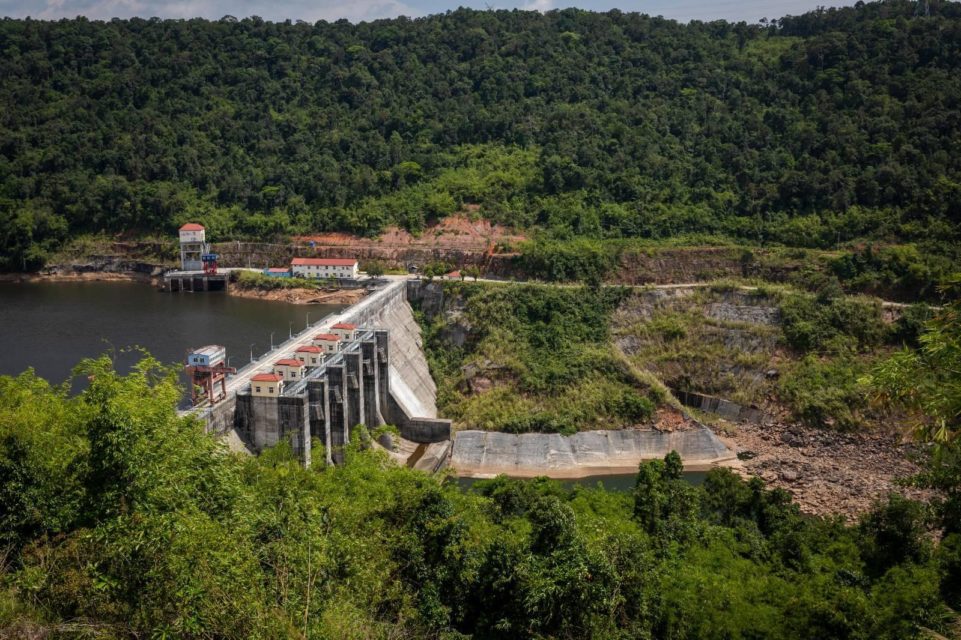
What’s Left of an Activist
In the few weeks she had known him, Plokhii, the former Cambodia Daily journalist, said she saw multiple fragments of Wutty’s personality: the stoic, and sometimes brusque side as he unearthed a yellow vine processing plant, but also a gentle and kind soul.
As she interviewed multiple colleagues and friends about Wutty posthumously, the nuances she saw deepened: She says they described him as an influential man, with diverse talents, one who could encourage the people to stand up and join, but also “an educator, an academic in a sense,” informing community members about Cambodian law and their rights.
“He was organized and focused and detail-oriented, and a very serious man, but he also had a warm, loving and gentle side, which I think made him an effective leader and environmental activist,” she said.
“What I say is a glimpse into him,” she continued. “My vision is, I think, accurate and real, but it’s a glimpse into Wutty. I wish I had more time with him because he really was extraordinary.”
Oudormreaksmey said he respected Wutty’s wishes to bring him to rest in his homeland of Kandal province next to Wutty’s own father, told to him two months before his father’s death as they drove through Koh Kong province investigating illegal logging together at midnight.
The son said he’ll always remember his father’s work, and so will the Cambodian people, even if Oudormreaksmey believed the government was working against Wutty’s wishes.
“Chut Wutty’s dream was to see Cambodia stop its deforestation and that timber manufacturing must be shut down, but it is very difficult since the government has no real commitment. … It does not want that since all officials are doing timber business, so if they get rid of it, that would impact themselves,” he said.
Indeed, logging has progressed and developments have been built in Wutty’s absence, leaving Koh Kong’s forest a patchwork of what it once was.
Forest Concession
Timbergreen, the target of Wutty’s final campaign, was awarded 3,500 hectares in 2010 across two locations to quite literally clear the path for Chinese state-owned power generation company China Datang Corporation to build two hydropower dams, the Stung Russei Chrum and Stung Tatay. Timbergreen was meant to prepare land for the reservoirs that China Datang would flood to generate power, but Timbergreen functioned more as a processing plant for luxury timber and yellow vine, according to more than a dozen media reports from the early 2010s.
Timbergreen vanished with Koh Kong’s weighty rosewood trees shortly after Wutty’s death, but by researcher Mira Kakonen’s estimate, the company left a legacy of releasing climate-debilitating emissions as well, because they failed to clear all trees on the land that became the reservoir — just taking the valuable ones, and thus causing methane emissions to enter the atmosphere when the dam company flooded the land.
But months before Wutty’s death, the dam projects were awarded funding by the Clean Development Mechanism, a climate change finance source established by the U.N. globally to promote projects that reduce emissions. The Cambodian government also received part of that funding.
Beyond the dams themselves, the company built roads and powerlines into the Koh Kong forest, and along those roads, the forest loss tracker Global Forest Watch shows pathways of deforestation following the Stung Russei Chrum river, the dam’s power lines and the company roads.
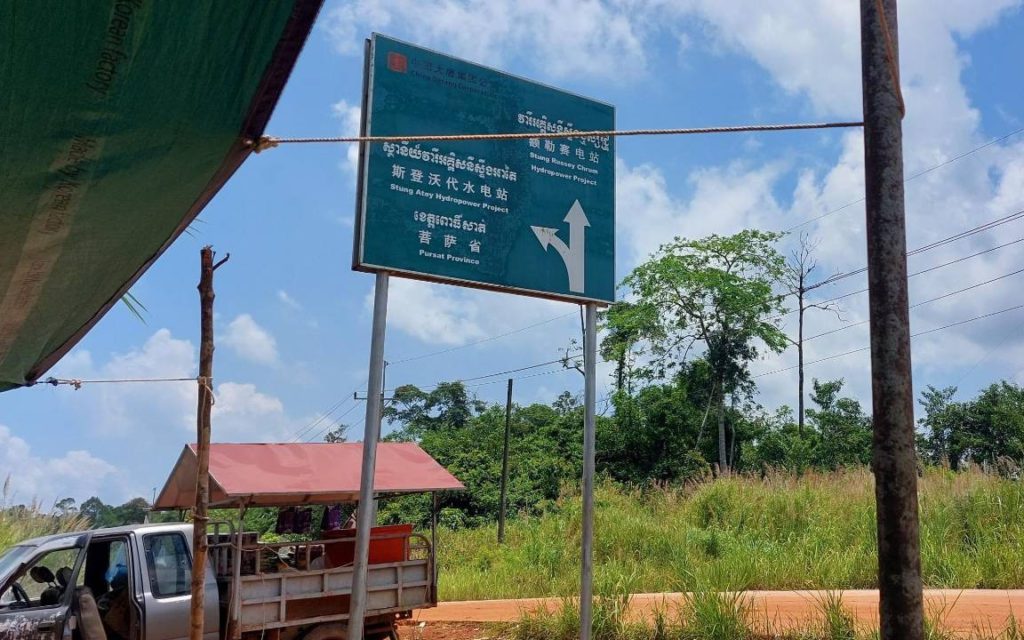
The Aftermath
At the space where a red dirt path peels off China Datang Corporation’s road between dams, an elderly couple had parked a pickup truck they rigged into a mobile shop, selling petrol, drinks and cup noodles to travelers who stop for a snack and some respite from the unrelenting sun.
When reporters arrived, a group of six soldiers from Koh Kong were just departing for the road to Pursat’s O’Som commune on motorbikes loaded with rice-sack bags, looking for a luxury plant called agarwood among the remaining forest. As they ended their break, one exclaimed: “The size of the wood is the size of the money you can make.”
Not an hour later, a yellow tourist van packed with travelers from Battambang offboarded on their journey to work in Thailand, each traveler buying noodles, dried fish snacks and drinks as they chitchatted.
At the center of the small roadside hub, the only stop for dozens of kilometers, an older man recalled to reporters how he heard the sound of shots in April 2012, and later traveled into the forest to find Wutty’s dead body.
He remembered how the two reporters accompanying the activist were taken to the province by military police, and how he and other residents nearby were questioned after. With little prompting, the elderly man recalled details matching Plokhii’s account of the incident. He heard the final struggle was over a memory card, while Plokhii remembers Wutty trying to retain his Canon camera.
However, they also disagreed in part: The elderly man remembers finding Wutty slumped over, and he pushed the activist’s body to sit upright; Plokhii does not recall Wutty’s body being moved.
Someone in a helicopter came after the shooting to take his testimony, he added.
“I told them that I did not know and I was at home and only heard an explosion. When I arrived he was already dead. I moved the car seat to move his body,” he recalled, saying he had sat the body upward out of sympathy for the slain forest defender.
The man couldn’t recall the name of the company that worked on the land he inhabits, but he remembered its bosses as “powerful,” while the company guard who was arrested as a “kind and gentle person” who bought rosewood from villagers. He also remembered how the company and its guards left shortly after Wutty’s death — the Stung Russei Chrum dam construction was completed later in 2012.
When the company receded from the scene, the man claimed that dozens of families moved into the area around Wutty’s murder site, partly to see the site of the shooting and partly to use the land, until Wild Aid — now known as Wildlife Alliance — kicked them out, threatening to burn houses if they stayed. Wildlife Alliance has been flagged multiple times for burning houses and evicting communities in the forest, with reports of the environmental organization’s officers most recently burning a Pursat resident’s tractor in 2020.
While construction workers are restoring roads and digging up earth along the China Datang road closer to Koh Kong’s provincial capital, the red dirt path to Pursat province is almost completely uninhabited, with even wider clearings unoccupied by nothing but grasses. The only buildings that remain are spirit houses.
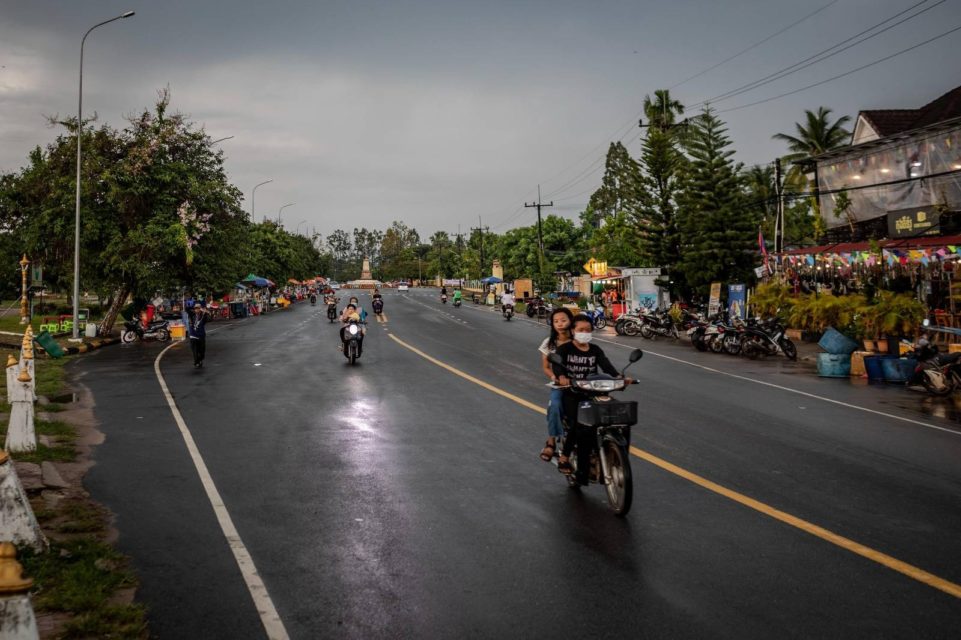
Wutty’s son Oudormreaksmey felt that the value of resources inside that forest had led to the web of crime over the years. The markets for rosewood and yellow vine have now evolved to electricity and agarwood.
“There were a lot of natural resources [in that forest], especially luxurious wood in the company’s land, so the company tried to hide [its crimes],” he said.
Khieu Sar Sileap, who was Timbergreen majority shareholder, could not be reached on numbers listed by associated organizations.
Just as he holds to his search for justice, Oudormreaksmey holds to the legacy of his father among other environmental activists. He believes no one has yet emerged who can protect the forest like his father, but others have been encouraged to take action.
“Even if the government does not give value to him, Cambodian people give value to him. … His legacy caused Cambodian people to love the forest and dare to stand up to protect it like he did.”
Updated on April 26 with more of Olesia Plokhii’s recollections of Chut Wutty.
Correction: An earlier version of this article misstated Olesia Plokhii’s timeline of flight into the woods and the position of Wutty’s body in the car when she returned.


